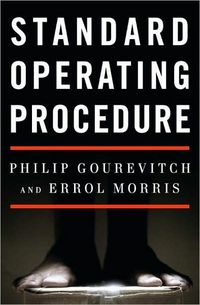

Purchase
Penguin Press
May 2008
On Sale: May 15, 2008
304 pages
ISBN: 1594201323
EAN: 9781594201325
Hardcover
Add to Wish List
Non-Fiction Political
Standard Operating Procedure is a war story that takes its
place among the classics. It is the story of American
soldiers who were sent to Iraq as liberators only to find
themselves working as jailers in Saddam Hussein’s old
dungeons, responsible for implementing the sort of policy
they were supposed to be fighting against. It is the story
of a defining moment in the war, and a defining moment in
our understanding of ourselves—the story of the infamous
Abu Ghraib photographs of prisoner abuse, as seen through
the eyes, and told through the voices, of the soldiers who
took them and appeared in them. It is the story of how
those soldiers were at once the instruments of a great
injustice and the victims of a great injustice. In a tradition of moral and political reckoning, and all-
powerful story-telling, that runs from Joseph Conrad’s The
Heart of Darkness and Fyodor Dostoevsky’s The Grand
Inquisitor to Norman Mailer’s The Executioner’s Song,
Philip Gourevitch has written a relentlessly surprising and
perceptive account of the front lines of the war on terror.
Drawing on more than two hundred hours of Errol Morris’s
startlingly frank and intimate interviews with the soldier-
photographers who gave us what have become the iconic
images of the Iraq war, Standard Operating Procedure is a
book that makes you see, and makes you feel, and above all
makes you think about what it means to be human. It is an
utterly original book that stands to endure as essential
reading long after the current war in Iraq passes from the
headlines—a work of searing power from two of our finest
masters of nonfiction, working at the peak of their powers.
Comments
No comments posted.
Registered users may leave comments.
Log in or register now!
| 

 © 2003-2025 off-the-edge.net
all rights reserved Privacy Policy
© 2003-2025 off-the-edge.net
all rights reserved Privacy Policy